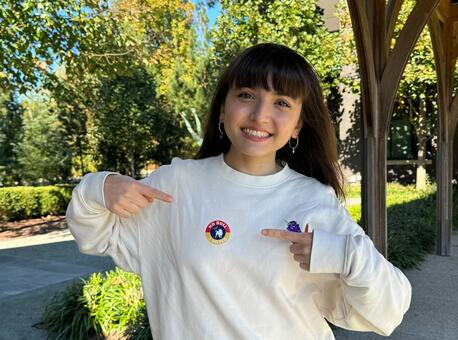
UNICEF USA Youth Leaders Advocate for Their Rights in D.C.
When UNICEF USA National Youth Council members bring their message to Washington, members of Congress listen.
In keeping with the Convention on the Rights of the Child and UNICEF's mission, UNICEF USA's National Youth Council works to help uphold every child's right to survive and thrive. This dedicated group of young leaders, ages 14–24, works within UNICEF USA and nationwide to voice the concerns and viewpoints of children and young people.
This past March, the National Youth Council traveled to Washington, D.C., to advocate for child and youth rights. Over three days, these youth leaders learned from and worked with leaders in mental health advocacy, gender-based violence and child education. They also walked the halls of the House of Representatives, meeting with Congressional offices and making their voices heard.

The No. 1 issue: Mental health support for young people
The most talked about issue across the board was undoubtedly youth mental health. Pooja Mehta, Senior Policy Associate at Inseparable and a National Alliance on Mental Illness board member, shared with the council that young people are making it clear that "the health of our minds cannot be separated from our bodies."
I believe that if kids get access to mental health care early, even before a diagnosis, you can set them up for success. — Kyle King, UNICEF USA National Youth Council
Like many students in a post-pandemic world, council members themselves struggle with issues like anxiety, depression and mental health excused absences. They want to address their struggles without being penalized, and to have access to the resources they need to stay healthy.
"I believe that if kids get access to mental health care early, even before a diagnosis, you can set them up for success," said National Youth Council member Kyle King. They urged their Representatives to invest in the mental well-being of children and youth in the U.S.

Hearing directly from young people translates legislation into lived experience
When elected officials hear directly from youth, it brings home how these bills directly affect members of Gen Z, translating legislation into lived experience.
"Youth voices matter, "said Mandy Slutsker, Director for Global Child Health Advocacy at the American Academy of Pediatrics,"because when elected officials hear from people, they count your voice more and what you say because you're not of voting age yet, but you're already politically active and your voice will only continue to get bigger."
[Elected officials] count your voice more and what you say because you're not of voting age yet, but you're already politically active and your voice will only continue to get bigger. — Mandy Slutsker, American Academy of Pediatrics
A call to end marriage before the age of 18, with no exceptions
The youth leaders came in with asks, not just spelling out various child rights issues but also giving their Representatives ways to fix them. For example, another issue youth were particularly passionate about is gender inequality. National Youth Council member Radhika Sharma, a high school senior in Connecticut, has been working with her UNICEF Club to raise the legal age for marriage to 18. In Connecticut, 1,246 minors were married from 2000 to 2020. Of these, 82 percent were girls who married adult men. Connecticut is now considering legislation that would prohibit child marriage in the state through the End Child Marriage Act.
Lynn Rosenthal, Director of Sexual and Gender-based Violence at the U.S. Department of Health and Human Services, who spoke to the National Youth Council, said that it is crucial that this type of work “comes from the community upwards” as that is what evolves social consciousness and affects the most change.
Are you a passionate young person looking to join a group of changemakers and make your voice heard?
Apply to be a UNICEF USA Youth Leader and help us build a better world for children.
HOW TO HELP
There are many ways to make a difference
War, famine, poverty, natural disasters — threats to the world's children keep coming. But UNICEF won't stop working to keep children healthy and safe.
UNICEF works in over 190 countries and territories — more places than any other children's organization. UNICEF has the world's largest humanitarian warehouse and, when disaster strikes, can get supplies almost anywhere within 72 hours. Constantly innovating, always advocating for a better world for children, UNICEF works to ensure that every child can grow up healthy, educated, protected and respected.
Would you like to help give all children the opportunity to reach their full potential? There are many ways to get involved.




